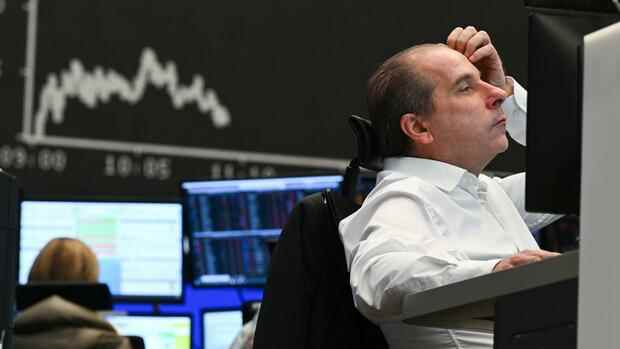The Russian attack on Ukraine has sent stock markets around the world plummeting.
(Photo: dpa)
Frankfurt After the price slump on Thursday, the experts are trying to draw up possible future scenarios. Martin Lück, chief investment strategist for Germany and Eastern Europe at Blackrock, is pessimistic: In his opinion, this typical “risk-off reaction” with falling stock prices and rising prices for safe havens such as gold and government bonds should continue as long as “it is uncertain how far the Russian President is willing to go”.
The strategist does not consider it seriously predictable how far stock indices such as the Dax, Euro Stoxx 50 and S&P 500 can still collapse: “It depends on the course of a war that has not happened on this scale in Europe for decades,” he said Handelsblatt.
The reaction of monetary policymakers will also play an important role. Lück says: “If the war should escalate in a way that causes major central banks such as the ECB and the Fed to suspend their planned tightening, a return to the yield levels at the beginning of the year would be conceivable, at least temporarily.” That would then be minus 0.12 percent for the 10-year Bund and 1.5 percent for the 10-year US Treasury.
Stefan Kreuzkamp, chief investment strategist at the fund company DWS, says: “For equities, European assets are at the center of the storm.” He rates the markets in the USA and Japan as significantly safer. In his opinion, stocks from the healthcare sector and suppliers of food could hold up relatively well.
Top jobs of the day
Find the best jobs now and
be notified by email.
In addition, Kreuzkamp mentions energy-dependent values in this context, such as those found in Great Britain, for example. Asset management HQ Trust sees China as the winner of the crisis. If Russia is isolated from the West, China can step in.
Robin Brooks, chief economist at the major banking organization IIF in Washington, believes that the euro will weaken substantially against the dollar. In his opinion, the US Federal Reserve (Fed) will continue to pursue its tight course. The European Central Bank (ECB), he believes, will proceed far more cautiously because Europe’s economy will be weakened much more directly by the dispute.
In fact, Greek central bank chief Yannis Stournaras has already spoken out in favor of continuing the ECB’s bond purchases at least until the end of the year – which would contradict recent statements by other ECB Governing Council members. The US bank Goldman Sachs also assumes that the Fed will continue its tightening course.
Hoping for a speedy recovery
Some experts are hoping that the markets will only collapse temporarily. Ulrich Kater, chief economist at Dekabank, says about the German stock index: “Levels of 11,000 to 12,000 points can definitely be reached on the Dax before the uncertainty subsides again.”
After that, however, the stock markets should recover, he believes, because German companies are in good shape. “Sales and earnings are solid, paying record-high dividends for 2021.” The yield on ten-year Bunds could “temporarily go back to zero percent”. But that will “not be sustainable because inflation and inflation expectations are rising,” says Kater.
On Thursday afternoon, the Dax was down more than four percent at just under 14,000 points, but had recovered somewhat from the lows of the day. Other European indices were between 3% and 4% in the red, with only the UK FTSE 100 hovering near the zero line. The euro lost around 1.6 percent against the dollar.
The yield on the ten-year Bund was just over 0.15 percent after temporarily reaching 0.26 percent the previous day. The capitalization of the Moscow Stock Exchange has roughly halved. More than 85 rubles had to be paid for one dollar on Thursday, compared to around 80 rubles the day before. IIF’s Brooks expects a deep recession due to tightening financing conditions in Russia.
Precious metals reach record values
Precious metals are a winner of the crisis. Gold, silver and palladium prices jumped Thursday but retreated from the highs. Gold remained above $1900 an ounce in the afternoon. “We expect the price to surpass $2,000 in the coming days if the Ukraine conflict escalates further,” said Bernard Dahdah, a commodities analyst at investment bank Natixis.
Carsten Fritsch, commodity analyst at Commerzbank, believes: “The price should continue to rise and swing up with the sanctions.” Then it would be a short way to the all-time high of August 7, 2020 at $ 2075. Measured in euros, a new top of 1764 euros was already reached on Thursday.
Ronald-Peter Stöferle, founder of the Liechtenstein asset management company Incrementum, sees the renewed interest of financial investors as a driver of the gold price. He dares a very long-term forecast and sees the price of gold at 5800 dollars in 2030.
Gold index funds, which are traded just like stocks and deposit the precious metal, play an important role. The well-known fund manager Jens Ehrhardt also relies on this. American institutional investors in particular would have bought gold after the pandemic stock market crash in March 2020, but exchanged gold for shares again with the rapid recovery in shares. “But the wave of sales in precious metals has now come to an end, and gold index funds are being bought again for the first time,” observes Ehrhardt. He expects higher inflation for a longer period of time, which in turn should boost the price of gold.
More: Dax closes above the 14,000 point mark – bank stocks slide






